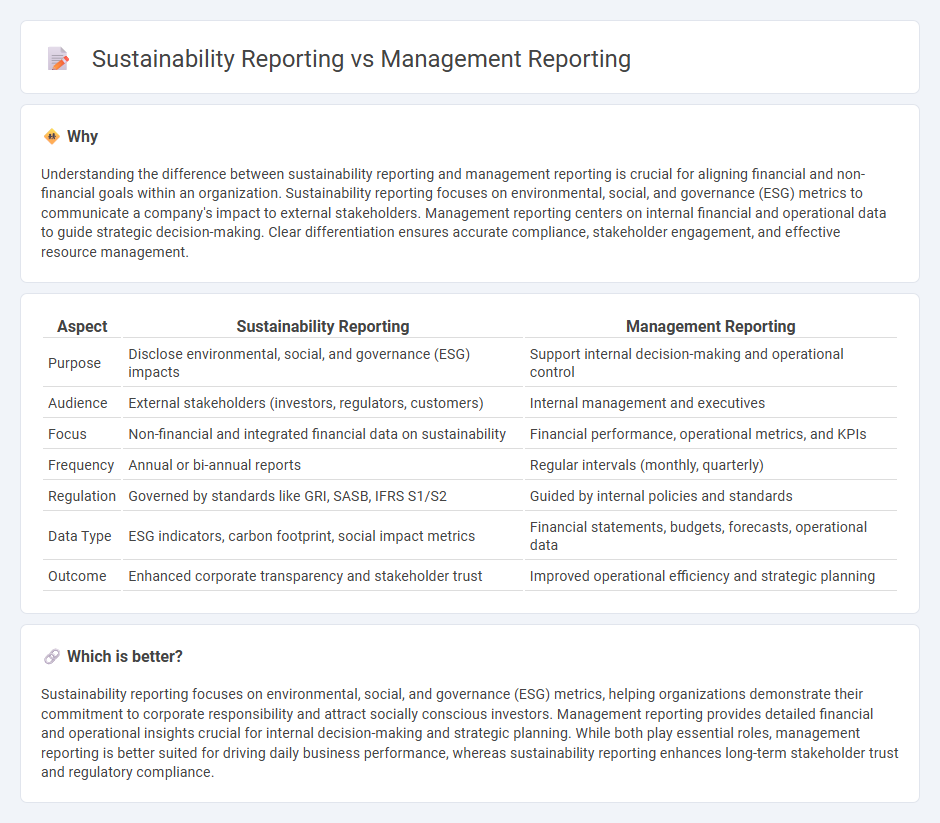
Sustainability reporting focuses on disclosing environmental, social, and governance (ESG) metrics to stakeholders, aligning financial performance with long-term impact and corporate responsibility. Management reporting concentrates on internal financial analysis, operational efficiency, and decision-making processes to optimize business performance. Explore the differences and synergies between these reporting types to enhance your organization's strategic insights.
Why it is important
Understanding the difference between sustainability reporting and management reporting is crucial for aligning financial and non-financial goals within an organization. Sustainability reporting focuses on environmental, social, and governance (ESG) metrics to communicate a company's impact to external stakeholders. Management reporting centers on internal financial and operational data to guide strategic decision-making. Clear differentiation ensures accurate compliance, stakeholder engagement, and effective resource management.
Comparison Table
| Aspect | Sustainability Reporting | Management Reporting |
|---|---|---|
| Purpose | Disclose environmental, social, and governance (ESG) impacts | Support internal decision-making and operational control |
| Audience | External stakeholders (investors, regulators, customers) | Internal management and executives |
| Focus | Non-financial and integrated financial data on sustainability | Financial performance, operational metrics, and KPIs |
| Frequency | Annual or bi-annual reports | Regular intervals (monthly, quarterly) |
| Regulation | Governed by standards like GRI, SASB, IFRS S1/S2 | Guided by internal policies and standards |
| Data Type | ESG indicators, carbon footprint, social impact metrics | Financial statements, budgets, forecasts, operational data |
| Outcome | Enhanced corporate transparency and stakeholder trust | Improved operational efficiency and strategic planning |
Which is better?
Sustainability reporting focuses on environmental, social, and governance (ESG) metrics, helping organizations demonstrate their commitment to corporate responsibility and attract socially conscious investors. Management reporting provides detailed financial and operational insights crucial for internal decision-making and strategic planning. While both play essential roles, management reporting is better suited for driving daily business performance, whereas sustainability reporting enhances long-term stakeholder trust and regulatory compliance.
Connection
Sustainability reporting and management reporting are connected through their shared goal of providing comprehensive insights into an organization's performance, combining financial data with environmental, social, and governance (ESG) metrics. Integrating sustainability metrics into management reporting enables organizations to drive strategic decision-making, improve risk management, and enhance long-term value creation. The convergence of these reporting frameworks supports transparency, compliance with regulatory standards, and stakeholder engagement in accounting practices.
Key Terms
**Management Reporting:**
Management reporting centers on providing timely, accurate financial and operational data to support business decisions and track performance against strategic goals. It includes key performance indicators (KPIs), budget analysis, variance reports, and forecast data tailored to internal stakeholders. Explore more to understand how management reporting drives efficient organizational control and strategy execution.
Key Performance Indicators (KPIs)
Management reporting emphasizes financial and operational KPIs such as revenue growth, profit margins, and productivity metrics to drive business performance. Sustainability reporting tracks environmental, social, and governance (ESG) KPIs including carbon emissions, resource usage, and social impact to ensure long-term corporate responsibility. Explore deeper insights on aligning KPIs for balanced management and sustainability reporting strategies.
Budget Variance
Management reporting emphasizes budget variance to monitor financial performance against planned goals, highlighting deviations that require corrective actions. Sustainability reporting, while less focused on budget variance, integrates environmental and social metrics, linking financial outcomes to long-term organizational impact. Explore how each reporting type uniquely leverages budget variance for strategic decision-making.
Source and External Links
Essential Elements for Effective Monthly Management Reports - This article discusses the essential elements and methods for creating effective monthly management reports to inform strategic decisions and track progress.
Management Reporting - CCH Tagetik - Wolters Kluwer - This webpage explains what management reporting is, its role in monitoring business activities, and how it facilitates strategic decision-making.
Managerial Reporting: Definition, Purpose and Best Practices - This article provides insights into managerial reporting, its purpose, and best practices for creating reports that support data-driven decision-making across departments.
 dowidth.com
dowidth.com